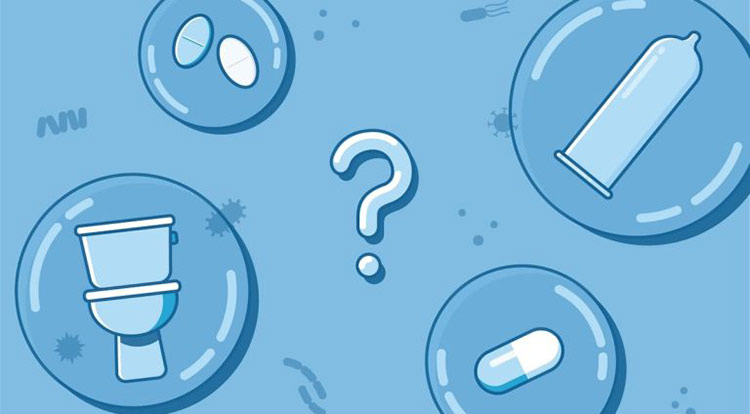With the hesitancy to talk openly about STDs and safer sex practices also comes pervasive misinformation and myths about STDs. In this blog we discuss some common myths about STDs and why they are not true.

Common myths about STDs
You can tell if someone has an STD just by looking at him or her: FALSE
STDs and STDs are often asymptomatic, meaning they do not show STD symptoms in the person who is infected. This means that the person infected with the STD usually cannot even tell that he or she has an STD. And if they can’t tell themselves, it’s even less likely that someone else can. Even with STDs that show symptoms, such as warts or sores, they can be in places that neither you nor your partner can see. In short, there is no way to determine if someone has an STD just by looking at him or her.
You cannot contract an STD if you have sex for the first time: FALSE
Any time you have sex or otherwise engage in risky activities with a partner who has an STD, you are at risk of contracting the infection. It doesn’t matter whether you’ve had sex before or not. It is also possible to contract an STD from someone who is a “virgin” or considers themselves a “virgin.” Some STDs can be passed from parent to child, and as we will discuss later in this blog, it is possible to contract an STD through activities other than penetrative sex. Regardless of your or your partner’s sexual history, you should never assume that you or they do not have an STD based on your experience. The only way to know for sure what your status is is to get tested.
Only ‘dirty’ people get STDs: FALSE
To debunk this myth, we must first dispel the idea that every person is “dirty” – unless he or she is actually covered in dirt. People are not “dirty” just because of their sexual activities, practices or preferences. While poor personal hygiene can promote or increase the severity of infections in some cases, people who model good hygiene can contract an STD just as easily as someone who does not practice good hygiene.
You cannot get an STD from oral or anal sex: FALSE
Most STDs can be easily transmitted through oral or anal sex. For the transmission of an STD to occur, the virus must enter the body through cuts, ulcers, or mucous membranes. It can do this through various fluids in the mouth, anal area, or genital area. Certain STDs can only be spread through skin-to-skin contact without any form of sex taking place.
You cannot get an STD as long as you use a condom: ESPECIALLY FALSE
Although you are generally less likely to get an STD with a condom than if you don’t use a condom or preventative at all, there are still ways to contract some STDs even if you use condoms. Sometimes external or internal condoms do not completely cover the infected areas (such as with genital warts or herpes) and STDs can still be transmitted despite condom use.
If you are in a relationship, you don’t have to worry about STDs: PARTLY FALSE
STDs and relationships can be a complicated topic. Although a committed relationship can reduce the risk of an STD, there are still instances when you or your partner(s) can contract an STD. Obviously, if a partner is unfaithful and contracts an STD from someone outside your relationship, this can lead to the STD being passed on to someone in the relationship. There are also cases where someone in the relationship may not have known they had an STD before entering the relationship, and then gets tested or starts showing symptoms later. In short, even though being in a committed relationship means you don’t have to worry about contracting an STD as often, it’s still a good idea for you and your partner(s) to get tested every now and then to be sure .
STDs disappear on their own: ESPECIALLY FALSE
Some STDs go away on their own, but these STDs are in the minority. Certain strains of HPV and hepatitis can clear up without treatment, but these are the only STDs that do so. Even if you contract these or other strains of HPV or hepatitis, these viruses can potentially return or lead to more serious problems. So there really isn’t a case in which you shouldn’t get tested or seek treatment for an STD you may contract.
If your partner withdraws, you cannot get an STD: FALSE
Although withdrawal can help reduce (but not eliminate) the risk of pregnancy, it still involves penetrative sex, which can result in the transmission of STDs.
You can get STDs in public swimming pools: ESPECIALLY FALSE
A public swimming pool is a highly unlikely place for someone to contract an STD. It is possible to contract an STD while swimming if there is sexual contact.
HIV myths
Many myths exist about HIV, possibly because it is one of the most worrying STDs you can contract. As a result, fear and misinformation can spread wildly about the disease itself, how it is contracted, and other facts and untruths. Questions about HIV can range from how difficult it is to contract HIV to whether or not mosquitoes can transmit HIV. We discuss some of the most common HIV myths here.
HIV will eventually kill you if you catch it: FALSE
First of all, HIV doesn’t technically kill anyone. When a person contracts HIV, the virus slowly attacks their immune system until it is so weak that they develop AIDS, which can eventually kill them. Although the virus and the disease are often discussed interchangeably, there is a difference between HIV and AIDS, and having one does not mean you have (or will eventually get) the other. Many people who contract HIV never develop AIDS.
Although HIV was once considered a very dangerous and deadly virus, with today’s modern medicine and treatment therapies, many people with HIV can live long, healthy, and normal lives.

Only gay men and drug users contract HIV: FALSE
This has been one of the most common myths surrounding HIV since we first became aware of the infection and how it was spread. Although the nature of the virus and its history puts people in these populations at higher risk of infection, HIV is like any other STD in that it does not discriminate against who it infects. Anyone who has sex or otherwise participates in behavior that could transmit an STD is at risk of contracting that STD, and the same goes for HIV.
Herpes Myths
As one of the most common STDs, myths about herpes also tend to spread faster and more widely than the disease itself.
You only have herpes if you have sores: FALSE
Many people who contract genital or oral herpes do not have an outbreak of sores immediately after infection, and for some it may even take years before an outbreak occurs. Even if someone hasn’t had an outbreak yet, he or she still has the herpes virus and can pass it on to their partners.
While it is true that herpes transmission to a partner is slightly less likely if there is no outbreak, it is still possible. It is also important to keep in mind that the sores are not always visible, such as the sores that occur in the mouth or vagina. So you shouldn’t assume that if you can’t see the sores that an outbreak isn’t happening.
You can contract herpes from a toilet seat: FALSE
The question of whether or not you can contract herpes from a toilet seat or another STD is a very popular question. So for the record, it is very unlikely, if not impossible, to contract herpes or any other STD from a toilet seat. To contract an STD from a toilet seat, the toilet seat must have been used by someone with an STD, and there must be fluid left on the toilet seat that carries the virus or bacteria. Since viruses and bacteria cannot survive for long outside the body, you should sit on the chair immediately after them and the fluids should come into contact with one of your mucous membranes or an open wound. There should also be enough fluid to carry enough virus or bacteria for it to develop into a full-blown infection. The likelihood of any of these specific cases happening is very unlikely, and there has never been a case of someone contracting an STD from a toilet seat.
Trichomoniasis Myths
What is trichomoniasis? Trichomoniasis is one of the most common STDs and STDs, but is often misunderstood or underrepresented in STD and STD education, which has led to the spread of myths about trichomoniasis.
Only women can get Trichomoniasis: FALSE
Although trichomoniasis is one of the most common STDs in women, men can still contract (and, more importantly, carry and transmit) trichomoniasis. Women are also more likely to experience symptoms from the infection than men, although the infection (like many STDs and STDs) is often asymptomatic anyway. Trichomoniasis can be easily treated with medication, but if left untreated it can cause more serious problems and put you at increased risk of HIV infection. It is therefore important to be tested regularly and treated if necessary.
Hopefully this blog has helped clear up some common myths about STD testing. Remember: It’s important to get tested regularly, know your status, and practice safer sex.



